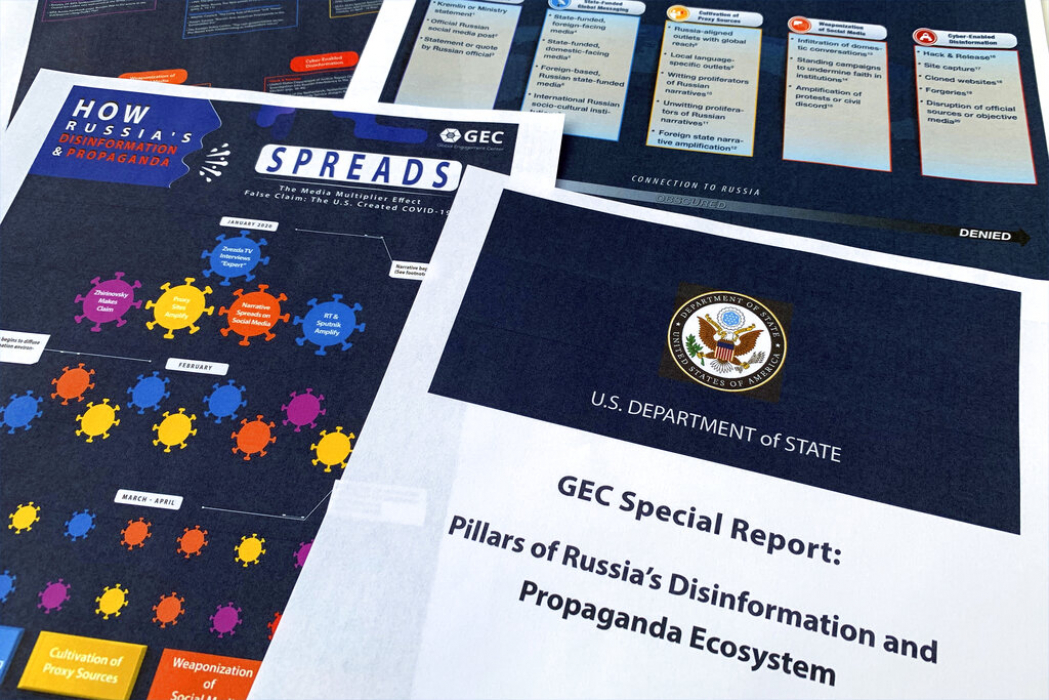In May 2022, the U.S. Department of Homeland Security announced the formation of a “Disinformation Governance Board” to guide the agency on addressing disinformation that threatened the national security of the United States.
The focus, the agency said, was on false information deliberately spread by foreign governments and other adversaries, particularly disinformation seeded in the United States by Russia, China, Iran and “transnational criminal organizations and human smuggling organizations,” according to its fact sheet. The Homeland Security agency pointed to those who smuggle immigrants across the Mexican border as an example of a human smuggling organization,
Public reaction was swift and negative, particularly in the news media and among Republican pundits and civil liberties advocates. Some portrayed the board as an Orwellian tool that could infringe on privacy and free speech rights. They likened it to the fictional “Ministry of Truth,” a propaganda machine that controlled information for Oceania citizens in George Orwell’s dystopian book, “1984.”
The blowback caused the agency to scrap the board, with an agency oversight council stating there was no need for it.
The board’s short-lived director resigned but warned that the United States is in “a really bleak situation.”
“The problem is there are very real national security issues here, and not being able to talk about this in a mature way is a real disservice to the country,” Nina Jankowicz said in a news interview.
Misinformation refers to false or misleading information shared about a topic that could be mistaken as truth. It can include honest mistakes, exaggerations and misunderstanding of fact, according to The Associated Press Stylebook. Disinformation, on the other hand, is misinformation that is deliberately spread with a purpose of misleading or confusing.
The board’s quick dissolution illustrates a fear of government control of information and censorship.
U.S. government concerned about Russia, China disinformation campaigns
Others have argued, however, that malicious foreign actors have taken advantage of American speech rights and engaged in a new level of covert information warfare, using social media in which disinformation is easily shared and magnified.
The U.S. Department of Justice’s Cyber Digital Task Force, established by then-Attorney General Jeff Sessions, said in a 2018 report that Russia’s covert disinformation campaign in the United States is intended to “sow division in our society, undermine confidence in democratic institutions, and otherwise affect political sentiment and public discourse to achieve strategic geopolitical objections.”
In describing how Russia’s state-sponsored Internet Research Agency worked during the 2016 presidential election, researchers have described a “firehose of falsehood” approach through which thousands of fake accounts on Twitter, Facebook and Instagram pushed false information. The idea was to turn Americans on each other by reinforcing a person’s perception of “in-group” or “out-group” ideals — making them less tolerant of people who may believe differently than they do and reinforcing their own beliefs to the point that they deeply distrust others who don’t believe the same.
Disinformation seeks to reduce trust in U.S. political system, researchers say
Specifically during the 2016 presidential election, the Russian Internet Research Agency “delivered targeted messages to Right, Left, and African-American communities” that was “made more effective by the echo chambers inherent in social media,” according to scholars Jill Goldenziel and Manal Cheema in “The New Fighting Words?: How U.S. Law Hampers the Fight Against Information Warfare.”
The Russian agency targeted right-wing groups with propaganda to generate anger and suspicion toward people considered left-wing. It targeted left-wing groups and Black Americans with messaging that “preyed on societal anger with structural inequalities, police violence and disproportionate levels of incarceration” and “using messages designed to reduce trust in the political system.”
Between 2013 and 2018, Russia’s Internet Research Agency reached 126 million Facebook users, 20 million Instagram users and 1.4 million Twitter users and uploaded 1,000 videos on YouTube. In addition, between 2015 and 2017, more than 30 million users shared Facebook and Instagram posts generated by Russia’s Internet Research Agency.
Counterspeech may be less effective on social media
Counterspeech is the doctrine relied upon in First Amendment law when countering falsehoods, standing for the principle articulated by Supreme Court Justice Louis D. Brandeis in 1927. Brandeis argued that the proper response to “falsehoods and fallacies” is to counter it with “more speech, not enforced silence.” In this way, people can weigh for themselves the values of competing ideas.
But Goldenziel and Cheema say that the Russian agency’s tactics of flooding and repeating messages make it difficult to discern truth from falsehoods.
They argue counterspeech is limited in the context of social media platforms in which echo chambers and human psychological tendencies create an environment in which people don’t hear contrary information or don’t want to.
Military reports say information warfare creates national security threat
Others have raised alarm that adversaries are using America’s commitment to free speech ideals against it in an information war that the U.S. government is ill-equipped to fight.
Daniel Morabito, commander of the 834th Cyberspace Operations Squadron in San Antonio, wrote in 2021 in “National Security and the Third-Road Threat” in the Air and Space Power Journal that the global trend toward faster data transfers across increasingly connected devices means “adversaries now maintain a presence in American homes, delivered through smartphones and other technology.”
“Within this rapidly evolving information environment, China and Russia are waging information wars against the United States calibrated to advance their national interests while avoiding direct and decisive military conflict with the West,” Morabito says.
“Their strategies center on exploiting America’s emphasis on free speech and freedom of the press which, by constitutional mandate, may not be infringed upon except under extraordinary circumstances. Consequently, the information environment competitive space is ill-suited for Department of Defense (DOD) intervention, exposing a gap in civilian and military thinking about how to defend the nation.”
Morabito calls for developing a framework for understanding how the U.S. can orient itself to counter information warfare. He describes the Chinese Communist Party’s disinformation activities and self-stated goal to “displace the United States as the world’s foremost power and restructure” and meet the party’s goal to restore itself to preeminence by 2049 as a particular looming threat.
Lawsuit accuses Biden administration of colluding to create censorship on social media
While the announcement of the Disinformation Governance Board drew public attention and concern about the federal government’s activities, efforts to reduce disinformation have been ongoing.

Secretary of Homeland Security Alejandro Mayorkas paused the work of the agency’s new disinformation governance board after weeks of criticism from Republicans and questions about whether the board would impinge on Americans’ free speech rights. A statement says DHS’ advisory board on homeland security will review the board’s work. (AP Photo/Mariam Zuhaib, File)
In 2018, after alarms about potential Russian intervention in the 2016 elections, Congress and President Donald Trump stepped up activities by signing the Cybersecurity and Infrastructure Security Agency Act, forming a new agency within the Department of Homeland Security.
An August 2022 report outlines some of the agency’s activities, including a task force to counter foreign influence, and calls for a more “unified strategy to counter disinformation campaigns.”
The formation of the Disinformation Governance Board in May of that year was an effort to “develop guidelines, standards and guardrails to ensure that the work that has been ongoing for nearly 10 years (regarding disinformation) does not infringe on people’s free speech rights, rights of privacy, civil rights and civil liberties,” Department of Homeland Security Secretary Alejandro Mayorkas told a Senate committee.
The next year, in 2023, the Annual Threat Assessment of the U.S. Intelligence Committee warned that efforts by Russia, China and other countries “to promote authoritarianism and spread disinformation is helping fuel a larger competition between democratic and authoritarian forms of government.”
Giving examples of Russian propaganda tactics during its Ukraine invasion, the report said: “Russia presents one of the most serious foreign influence threats to the United States because it uses its intelligence services, proxies and wide-ranging influence tools to try to divide Western alliances and increase its sway around the world.”
Despite concerns about the role of disinformation seeded by foreign actors, there is still substantial concern that the U.S. government will go too far and use its power to suppress speech.
After the announcement of the Disinformation Governance Board, the attorneys general of Missouri and Louisiana sued the Joe Biden administration and other government officials in Missouri et al v. Biden et al, accusing them of coercing social media companies to suppress disfavored viewpoints and speakers.
The lawsuit cited the Disinformation Governance Board as an example of a “campaign of censorship” within the Department of Homeland Security.
Deborah W. Fisher is director of the John Seigenthaler Chair of Excellent in First Amendment Studies. This article was published May 11, 2023.

